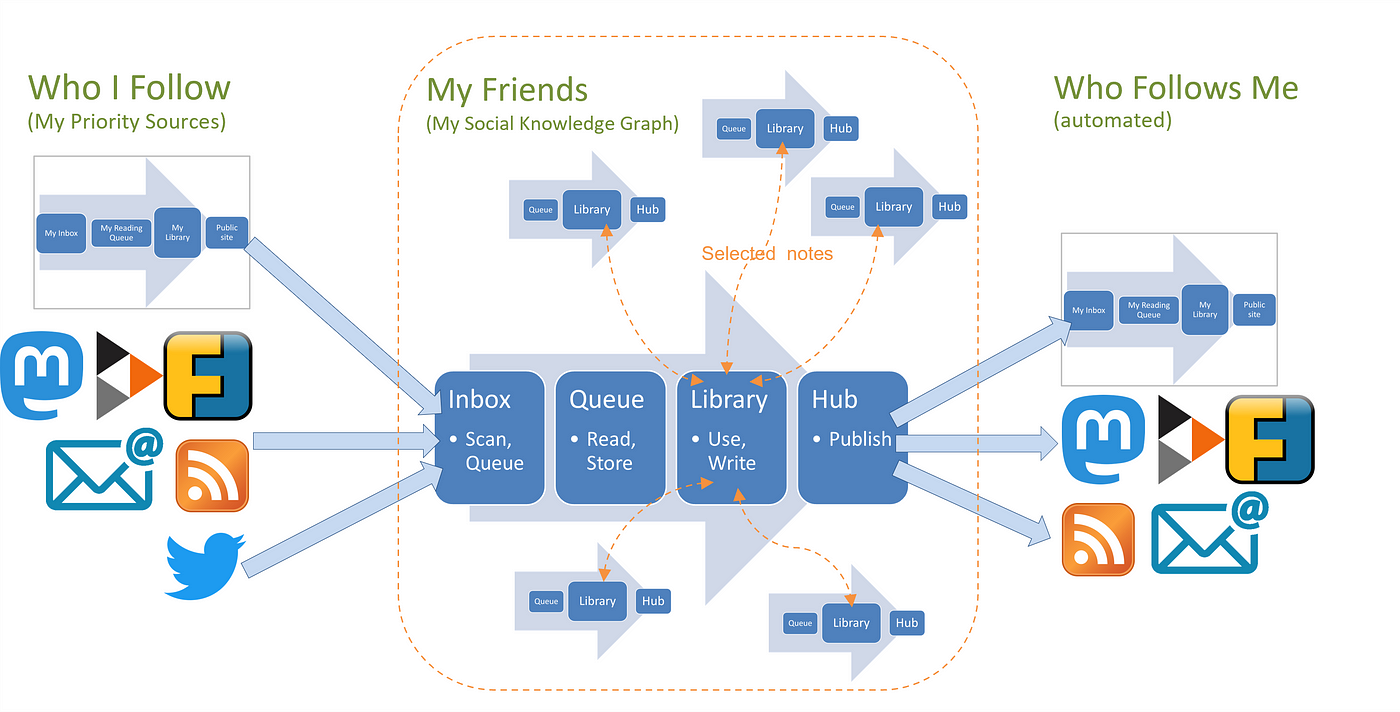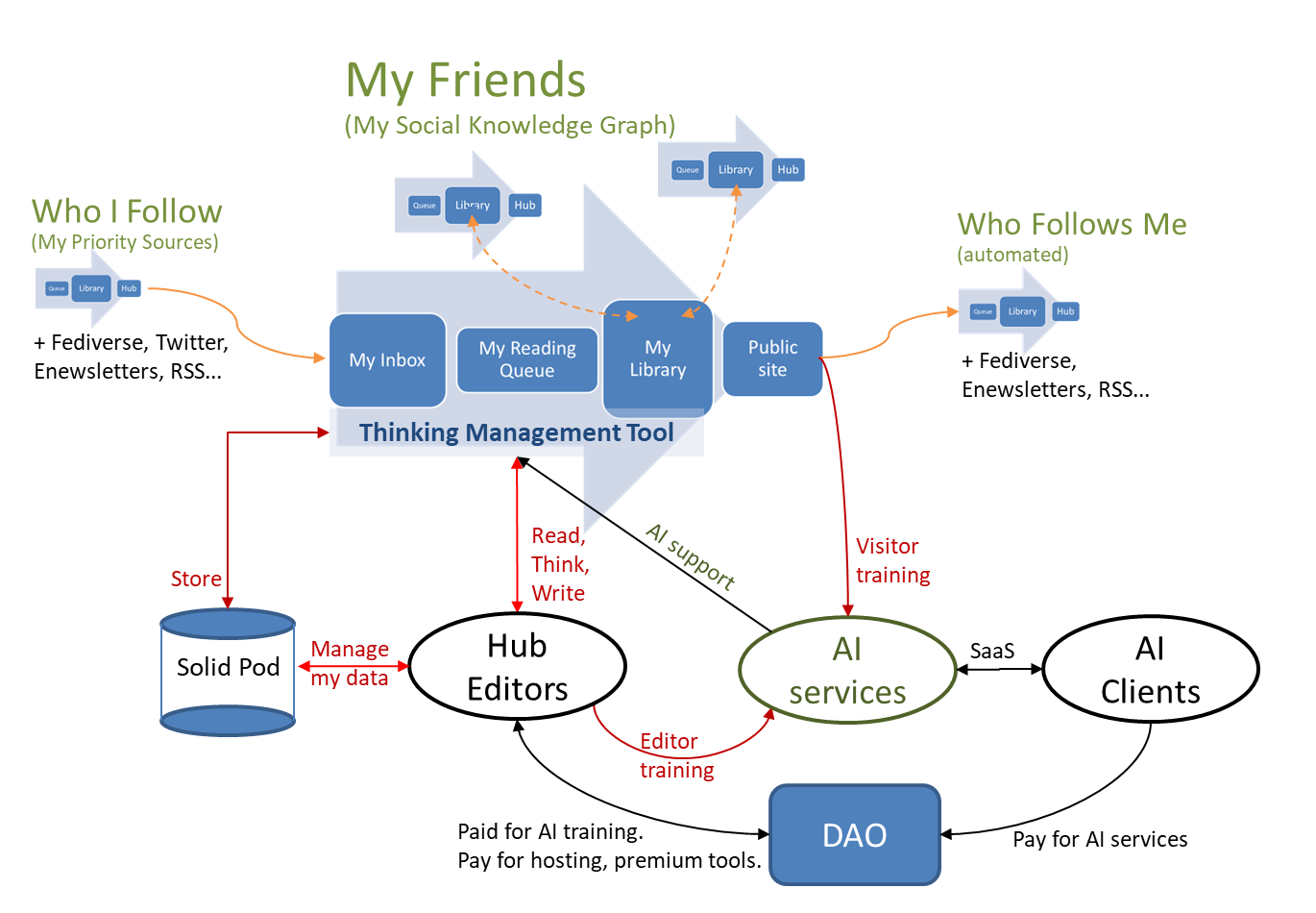reply to: https://ariadne.space/2022/07/01/a-silo-can-never-provide-digital-autonomy-to-its-users/
Matt Ridley indicates in The Rational Optimist that markets for goods and services "work so well that it is hard to design them so they fail to deliver efficiency and innovation" while assets markets are nearly doomed to failure and require close and careful regulation.
If we view the social media landscape from this perspective, an IndieWeb world in which people are purchasing services like easy import/export of their data; the ability to move their domain name and URL permalinks from one web host to another; and CMS (content management system) services/platforms/functionalities, represents the successful market mode for our personal data and online identities. Here competition for these sorts of services will not only improve the landscape, but generally increased competition will tend to drive the costs to consumers down. The internet landscape is developed and sophisticated enough and broadly based on shared standards that this mode of service market should easily be able to not only thrive, but innovate.
At the other end of the spectrum, if our data are viewed as assets in an asset market between Facebook, Instagram, Twitter, LinkedIn, et al., it is easy to see that the market has already failed so miserably that one cannot even easily move ones' assets from one silo to another. Social media services don't compete to export or import data because the goal is to trap you and your data and attention there, otherwise they lose. The market corporate social media is really operating in is one for eyeballs and attention to sell advertising, so one will notice a very health, thriving, and innovating market for advertisers. Social media users will easily notice that there is absolutely no regulation in the service portion of the space at all. This only allows the system to continue failing to provide improved or even innovative service to people on their "service". The only real competition in the corporate silo social media space is for eyeballs and participation because the people and their attention are the real product.
As a result, new players whose goal is to improve the health of the social media space, like the recent entrant Cohost, are far better off creating a standards based service that allows users to register their own domain names and provide a content management service that has easy import and export of their data. This will play into the services market mode which improves outcomes for people. Aligning in any other competition mode that silos off these functions will force them into competition with the existing corporate social services and we already know where those roads lead.
Those looking for ethical and healthy models of this sort of social media service might look at Manton Reece's micro.blog platform which provides a wide variety of these sorts of data services including data export and taking your domain name with you. If you're unhappy with his service, then it's relatively easy to export your data and move it to another host using WordPress or some other CMS. On the flip side, if you're unhappy with your host and CMS, then it's also easy to move over to micro.blog and continue along just as you had before. Best of all, micro.blog is offering lots of the newest and most innovative web standards including webmention notificatons which enable website-to-website conversations, micropub, and even portions of microsub not to mention some great customer service.
I like to analogize the internet and social media to competition in the telecom/cellular phone space In America, you have a phone number (domain name) and can then have your choice of service provider (hosting), and a choice of telephone (CMS). Somehow instead of adopting a social media common carrier model, we have trapped ourselves inside of a model that doesn't provide the users any sort of real service or options. It's easy to imagine what it would be like to need your own AT&T account to talk to family on AT&T and a separate T-Mobile account to talk to your friends on T-Mobile because that's exactly what you're doing with social media despite the fact that you're all still using the same internet. Part of the draw was that services like Facebook appeared to be "free" and it's only years later that we're seeing the all too real costs emerge.
This sort of competition and service provision also goes down to subsidiary layers of the ecosystem. Take for example the idea of writing interface and text editing. There are (paid) services like iA Writer, Ulysses, and Typora which people use to compose their writing. Many people use these specifically for writing blog posts. Companies can charge for these products because of their beauty, simplicity, and excellent user interfaces. Some of them either do or could support the micropub and IndieAuth web standards which allow their users the ability to log into their websites and directly post their saved content from the editor directly to their website. Sure there are also a dozen or so other free micropub clients that also allow this, but why not have and allow competition for beauty and ease of use? Let's say you like WordPress enough, but aren't a fan of the Gutenberg editor. Should you need to change to Drupal or some unfamiliar static site generator to exchange a better composing experience for a dramatically different and unfamiliar back end experience? No, you could simply change your editor client and continue on without missing a beat. Of course the opposite also applies—WordPress could split out Gutenberg as a standalone (possibly paid) micropub client and users could then easily use it to post to Drupal, micro.blog, or other CMSs that support the micropub spec, and many already do.
Social media should be a service to and for people all the way down to its core. The more companies there are that provide these sorts of services means more competition which will also tend to lure people away from silos where they're trapped for lack of options. Further, if your friends are on services that interoperate and can cross communicate with standards like Webmention from site to site, you no longer need to be on Facebook because "that's where your friends and family all are."
I have no doubt that we can all get to a healthier place online, but it's going to take companies and startups like Cohost to make better choices in how they frame their business models. Co-ops and non-profits can help here too. I can easily see a co-op adding webmention to their Mastodon site to allow users to see and moderate their own interactions instead of forcing local or global timelines on their constituencies. Perhaps Garon didn't think Webmention was a fit for Mastodon, but this doesn't mean that others couldn't support it. I personally think that Darius Kazemi's Hometown fork of Mastodon which allows "local only" posting a fabulous little innovation while still allowing interaction with a wider readership, including me who reads him in a microsub enabled social reader. Perhaps someone forks Mastodon to use as a social feed reader, but builds in micropub so that instead of posting the reply to a Mastodon account, it's posted to one's IndieWeb capable website which sends a webmention notification to the original post? Opening up competition this way makes lots of new avenues for every day social tools.
Continuing the same old siloing of our data and online connections is not the way forward. We'll see who stands by their ethics and morals by serving people's interests and not the advertising industry.

